|
|
|
Sort Order |
|
|
|
Items / Page
|
|
|
|
|
|
|
| Srl | Item |
| 1 |
ID:
101589
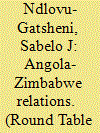

|
|
|
|
|
| Publication |
2010.
|
| Summary/Abstract |
The common approach to the study of foreign policies of Southern African Development Community (SADC) states is to locate them within the context of 'brother presidents' and 'sister liberation movements'. There is emphasis on liberation war camaraderie as a key variable. However, Angola-Zimbabwe (read as MPLA-ZANU-PF and MPLA-MDC) relations have no noticeable strong liberation war-time ties. The relations are traceable to the post-1980 period when the Zimbabwe African National Union-Patriotic Front (ZANU-PF) pursued a deliberate policy of integrating itself within the SADC region and this coincided with the Popular Movement for the Liberation of Angola's (MPLA) long-time desire to isolate its internal enemies of the National Front for the Liberation of Angola and the National Union for the Total Independence of Angola. What is also noticeable is the opacity and ambiguities in Angola-Zimbabwe relations, which have provoked growth of speculation and suspicion. The only time Angola and Zimbabwe openly collaborated was in their intervention in the Democratic Republic of Congo war in 1998 under the auspices of the SADC in general and the SADC Organ on Politics, Defence and Security in particular. However, two recent developments-the state visit to Luanda by the Prime Minister of Zimbabwe and the leader of the Movement for Democratic Change (MDC-T) Morgan Tsvangirai in October 2009, and the announcement by ZANU-PF of the China-Sonangol $8bn investment deal in November 2009-have provoked fresh interest in understanding Angola-Zimbabwe relations in the context of a regional initiative to resolve the Zimbabwe crisis. Although Angola is visible as a member of the SADC in the search for a solution to the Zimbabwe crisis, it has not openly expressed its foreign policy towards Zimbabwe. Unlike Botswana under Ian Khama and Zambia under the late Levy Mwanawasa, which openly criticised President Robert Mugabe and ZANU-PF over governance and its human rights record, Angola has remained quiet, making it hard to know its exact position vis-agrave-vis initiatives towards resolution of the Zimbabwe crisis. Interest in Angolan foreign policy is further motivated by the fact of its ascendancy as one of the regional powers; building on its rich mineral resources, it has the potential leverage to help in the resolution of the Zimbabwe crisis if it openly expressed its position. At the moment, it is not clear whether Angola has also adopted 'quiet diplomacy', just like South Africa under President Thabo Mbeki in its dealings with Zimbabwe.
|
|
|
|
|
|
|
|
|
|
|
|
|
|
|
|
| 2 |
ID:
101591
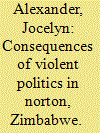

|
|
|
|
|
| Publication |
2010.
|
| Summary/Abstract |
The lasting consequences of violent politics in Zimbabwe cannot be fully grasped without exploring both their institutional and material contexts and local interpretations of the meaning of particular acts of violence. Drawing on narratives of political violence from the town of Norton, three points are made. First, the extreme electoral violence of 2008 was interpreted by opposition members as an almost inexplicable moment of rupture. As a result, it damaged social relations in lasting ways. Second, the powerful link between the ruling party's coercive politics and people's livelihoods in a context of economic collapse meant that violence had deeply damaging effects on every aspect of people's lives from which many have not yet recovered. Third, regardless of their party affiliation, people's political relations with Zimbabwe's Inclusive Government, established in 2009, have been powerfully shaped by their understandings of the material and other obligations constituted through violence and suffering in previous years.
|
|
|
|
|
|
|
|
|
|
|
|
|
|
|
|
| 3 |
ID:
101592


|
|
|
|
|
| Publication |
2010.
|
| Summary/Abstract |
The power-sharing agreement in Zimbabwe has ushered in a period of engagement between the diaspora and homeland government, marking a distinct change from the hostility that characterised relations over previous years. This article discusses the politics of this repositioning and the character of the new diasporic organisations formed in the wake of the Global Political Agreement to take forward agendas of development and reconstruction at home. It argues that these new diasporic organisations have tried to create non-partisan platforms for engagement, have an elite social base, and connect responsibilities for development at home with the desire for formal political rights. Despite an apparent convergence of interest around development and reconstruction on the part of an array of diaspora groups, as well as the Zimbabwean and British governments, there are, nonetheless, tensions among these actors that this article seeks to reveal. It argues that a key issue shaping conversations over engagement is the divergence of interest within the diaspora between those with and without security in their states of residence. This divide is likely to become more salient in the context of a large-scale return programme, especially if there is ongoing uncertainty in Zimbabwe and if repatriation is conceived as a final one-way movement rather than as part of an ongoing circulation in which people may choose to maintain transnational lives. This discussion of the Zimbabwean case thus contributes to broader debates over the tensions that characterise policies of 'diaspora engagement'.
|
|
|
|
|
|
|
|
|
|
|
|
|
|
|
|
| 4 |
ID:
101590
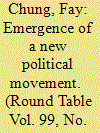

|
|
|
|
|
| Publication |
2010.
|
| Summary/Abstract |
Zimbabwe's turbulent electoral history is seldom recounted by a political insider. The author, a former Minister in a Zimbabwe African National Union-Patriotic Front (ZANU-PF) government, and a Senatorial candidate for Simba Makoni in the contentious 2008 elections, charts the electoral volatility of Zimbabwe, probes the advent and subsequent split in the Movement for Democratic Change, and champions the alternative provided by Simba Makoni, also once a Minister under Mugabe, who deserted ZANU-PF.
|
|
|
|
|
|
|
|
|
|
|
|
|
|
|
|
| 5 |
ID:
101593


|
|
|
|
|
| Publication |
2010.
|
| Summary/Abstract |
The Global Political Agreement (GPA) signed between the two Movements for Democratic Change and the Zimbabwe African National Union-Patriotic Front (ZANU-PF) set the change for a new set of political dynamics in Zimbabwe. Although it has not transformed the coercive base of ZANU-PF's support, it has led to new battles for state power and changes in the strategies of the major political parties. The discussion below uses the great Italian Marxist Antonio Gramsci's conception of the 'passive revolution' to understand the changes in the political economy that have marked recent Zimbabwean politics, looking in particular at the different approaches of the three parties to the GPA during this period.
|
|
|
|
|
|
|
|
|
|
|
|
|
|
|
|
| 6 |
ID:
101588


|
|
|
|
|
| Publication |
2010.
|
| Summary/Abstract |
Be robust, be tough on self-serving tyrants whose hands are dripping with the blood of their own people.' This has been the mantra chanted with quasi-religious conviction, directed at leaders of South Africa, the Southern African Community and the African Union. Proponents of this doctrine of coercive diplomacy are moved by a spirit that connects humanitarian intervention to regime change and the rights of democratic states to replace illiberal tyrants in the name of both the victims and the wider call of security for the ethically superior liberal parts of the world. This article examines the comparative utility of the approach outlined above vis-agrave-vis an approach that privileges suasion and engagement over confrontation. Serving as a representative case study for this comparison are three African countries, which have been mired in conflicts that led to untold human suffering: the Democratic Republic of Congo, Sudan and Zimbabwe. The article argues that not only do proponents of coercive diplomacy fundamentally misconceive the political dynamics of the countries, region and continent in which they are seeking to intervene, but also that rather than providing an answer to the problem at hand, their tough posture is at best ineffective and at worst counter-productive. Indeed, experience in these countries, and in others such as Angola, Namibia, Mozambique and South Africa before them, challenges the universality of diplomatic approaches and assumptions that deify coercive diplomacy as a means of solving conflicts. The article concludes by elaborating on the nuances of the competing diplomatic approaches. These nuances, as well as the evidence culled from the three experiences, buttress the author's view that the people and governments of Africa share with the rest of the world a desire for a conflict-free continent and a peaceful world. As they increase their agency for bringing this result about, they require and deserve to be supported by the rest of the world.
|
|
|
|
|
|
|
|
|
|
|
|
|
|
|
|
| 7 |
ID:
101594
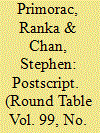

|
|
|
| 8 |
ID:
101587
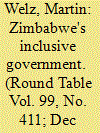

|
|
|
|
|
| Publication |
2010.
|
| Summary/Abstract |
Zimbabwe seemed to be in a political transition-but only on the surface. In actual fact, the new government established under the power-sharing agreement between President Mugabe and newly elected Prime Minister Morgan Tsvangirai proved unsuccessful in its first 100 days owing to continued rivalry and a lack of commitment on behalf of Mugabe and his party. Mugabe managed to secure key positions in the new government for his cronies. They continued to control the relevant security organs as well as the Reserve Bank, which held a key position because its Governor guarded the budget available for the new ministers. Consequently, sabotage was an imminent threat for the new government. Mugabe benefited from the weakness of the opposition, which was split and had an indecisive and uncharismatic leader who failed to secure financial support from the West. To complicate the situation even further there were more players involved in the political arena of Zimbabwe, including the two major farmers' groupings, an emerging third party under Simba Makoni, the trade unions and white businessmen. They all had their own agenda. Mugabe and his ruling clique relied on each other as they had both committed gross human rights violations over the last 25 years. They either fall together or their mutual dependency keeps them going. Change was unlikely to occur; even the new Movement for Democratic Change ministers were aware of this.
|
|
|
|
|
|
|
|
|
|
|
|
|
|
|
|
|
|
|
|
|